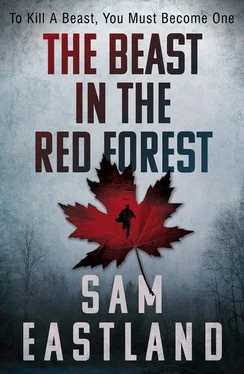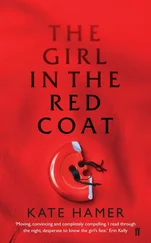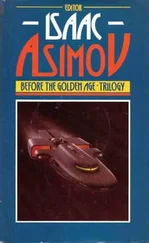Sam Eastland - The Beast in the Red Forest
Здесь есть возможность читать онлайн «Sam Eastland - The Beast in the Red Forest» весь текст электронной книги совершенно бесплатно (целиком полную версию без сокращений). В некоторых случаях можно слушать аудио, скачать через торрент в формате fb2 и присутствует краткое содержание. Год выпуска: 2013, ISBN: 2013, Издательство: Faber & Faber, Жанр: Исторический детектив, на английском языке. Описание произведения, (предисловие) а так же отзывы посетителей доступны на портале библиотеки ЛибКат.
- Название:The Beast in the Red Forest
- Автор:
- Издательство:Faber & Faber
- Жанр:
- Год:2013
- ISBN:9780571281466
- Рейтинг книги:4 / 5. Голосов: 1
-
Избранное:Добавить в избранное
- Отзывы:
-
Ваша оценка:
- 80
- 1
- 2
- 3
- 4
- 5
The Beast in the Red Forest: краткое содержание, описание и аннотация
Предлагаем к чтению аннотацию, описание, краткое содержание или предисловие (зависит от того, что написал сам автор книги «The Beast in the Red Forest»). Если вы не нашли необходимую информацию о книге — напишите в комментариях, мы постараемся отыскать её.
The Beast in the Red Forest — читать онлайн бесплатно полную книгу (весь текст) целиком
Ниже представлен текст книги, разбитый по страницам. Система сохранения места последней прочитанной страницы, позволяет с удобством читать онлайн бесплатно книгу «The Beast in the Red Forest», без необходимости каждый раз заново искать на чём Вы остановились. Поставьте закладку, и сможете в любой момент перейти на страницу, на которой закончили чтение.
Интервал:
Закладка:
Yakushkin’s mood had been soured even before he arrived by news of Colonel Andrich’s murder. Yakushkin had met with Colonel Andrich on several occasions. He had warned the colonel that a truce with the partisans could never be achieved, but Andrich was determined to succeed. Yakushkin could not help admiring the colonel’s tenacity, even though he was, himself, convinced of the inevitable failure of the mission. As a gesture of goodwill, Yakushkin had even loaned the colonel his own chauffeur, Sergeant Zolkin, along with his beloved American Lend-Lease Willys Jeep.
Now Zolkin was missing, probably lying dead somewhere among the ruins. His jeep had been found, still parked outside the bunker, although so riddled with shrapnel that the motor pool mechanics weren’t sure it would ever run again.
The driver and the Willys Jeep could be replaced, but Andrich could not. As far as Yakushkin was concerned, the blame for these killings lay entirely with the partisans. They had been given a chance for peace, and they had squandered it. From now on, he thought to himself, the partisans will have to deal with us, and we do not negotiate.
Yakushkin was proud of his brigade’s bloody reputation, so much so that when its former commander, Grigori Danek, began to show a change of heart, Yakushkin was forced to take action.
In the old days, Danek had ordered his troops to open fire at the first sign of trouble, and the resulting massacres combined into a tally of butchery unmatched by any other branch of NKVD.
‘The only thing that impresses me,’ Danek had once growled to Yakushkin in one of his vodka-fuelled tirades, ‘is the efficiency with which we dispatch our enemies into the afterlife.’
But with the end of the war now in sight, Danek had begun to see things differently. He believed that the role of SMERSH had to change, and change quickly, before they found themselves scapegoats in the post-war world for all manner of atrocities, even those which they had not actually committed. In a conflict already brimming with horrors, what made SMERSH different was that the blood on their hands came mostly from their own countrymen.
This detail had never bothered Yakushkin, who saw his brigade as an instrument of vengeance for all who opposed Stalin’s will, no matter where they came from.
Danek spoke incessantly of a day of reckoning which he felt must surely come for those who had dispensed this vengeance.
Finally, Yakushkin had heard enough. When he encountered Danek, alone and too drunk to stand in an alley in the city of Minsk, he strangled the commander with his bare hands, employing an efficiency of technique which even Danek might have found impressive if he had not been on the receiving end of it.
In the days that followed, Yakushkin himself was put in charge of leading a thorough investigation into Danek’s murder, which naturally produced no results. The lack of reaction from Moscow was Yakushkin’s first real sign that Danek’s change of heart had come under unfavourable scrutiny from someone other than himself.
As the natural choice to succeed Danek, Yakushkin proved so successful that he had recently been informed of his transfer to headquarters in Moscow, to take effect as soon as this current task had been completed. For Yakushkin, this was a chance of a lifetime. Nothing could be allowed to prevent it, even if that meant the death of every partisan in Ukraine.
Such lofty goals do not come cheap to those who set them, and Yakushkin’s nerves were strained almost to breaking point.
The one thing which gave him comfort was the smell of food coming from the kitchen around the corner. Nurse Antonina was making tsapkhulis tsveni , a stew made with myslyvska sausages, apples, canned beans, eggplant and dried chilli peppers — all of which he had brought her as a gift the day before, with the understanding that they would be used to prepare a meal of which she would be allowed to eat a small portion. Yakushkin’s mouth flooded with saliva as he smelled the cardamom and pepper with which the sausages had been seasoned.
Since Yakushkin had begun paying visits to Antonina, the nurse had prepared several memorable meals: partridge in sour cream, venison with cranberries and khachapuri cheese bread. Of course, he had been obliged to supply the ingredients for these as well. A nurse at a field hospital could hardly be expected to find enough butter, eggs and meat to feed herself, let alone a man with such an appetite. But for someone of Yakushkin’s rank, these things were not hard to come by. It was finding someone to prepare them which provided the greater challenge.
Yakushkin listened to Antonina’s footsteps as she moved around the kitchen, the soft knocking of a wooden spoon against the sides of the stew pot as she stirred the meal and her humming of a tune he had not heard since childhood and whose name he’d never known.
It was past Yakushkin’s normal dinner time, but it had taken much longer than expected to oversee the clearing-out of munitions from the bunker where Andrich had been killed. By the time he arrived on Antonina’s doorstep, she had already gone to bed, but since Yakushkin had no intention of leaving without supper, he cajoled her into preparing a meal.
Yakushkin would have settled for a bowl of kasha , but instead Antonina had insisted on making a stew, which was taking forever to prepare, using all the ingredients he had given her.
Now Yakushkin wished he hadn’t come at all. In the hour he’d spent waiting, his stomach had become an empty chasm. When he got hungry like this, he became irrationally bad-tempered. His bodyguard, Molodin, knew to carry food on him at all times for just such occasions. The careers and even lives of men had been saved by Molodin’s quick thinking, as he pressed into the commander’s hand an apple, or a scrap of sweet churchkhela , made from rendered grape juice, flour and chopped walnuts, or a two-day-old vareniki dumpling stuffed with pickled cabbage, carefully saved in Molodin’s handkerchief.
Too irritated to sit still, Yakushkin got out of his chair and strode to the top of the stairs. The staircase descended to a narrow hallway, at the end of which was a door leading out to the street. Antonina’s apartment had no rooms on the ground floor, which was taken up by another apartment. ‘Molodin!’ he boomed.
The front door opened and, a moment later, Molodin himself appeared at the bottom of the stairs. He was a slight but agile man, with a pale, angular face, neatly shaved head and eyes the milky green colour of opals. Draped across his shoulders was a rain cape, in whose folds the sleet clustered like frog spawn. Slung across his chest beneath the cape, Molodin carried a PPSh sub-machine gun. ‘Is everything all right, Commander?’ he asked, and, as he spoke, his hand appeared from beneath his dripping rain cape. Pinched between his fingers was a piece of cheese, which he had been saving for his own breakfast. ‘Something to eat, perhaps?’
‘Keep it!’ Yakushkin smiled down at him. ‘I can’t steal another man’s meal!’ The truth was, Yakushkin would gladly have eaten Molodin’s last crumb of food, but he did not like the look of that cheese, cracked and yellowed like an old toenail, or the unwashed hand which held it out to him.
Molodin nodded, relieved not to be parting with his rations.
‘Don’t worry,’ said Yakushkin. ‘There’ll be plenty to eat when we get to Moscow.’
Molodin smiled gratefully although, in truth, he detested city life, and would never have set foot in Moscow unless ordered to do so.
‘Go on!’ Yakushkin waved him away cheerfully. ‘Back to work!’
‘Yes, Commander,’ replied Molodin, as he returned to his post outside the front door.
Читать дальшеИнтервал:
Закладка:
Похожие книги на «The Beast in the Red Forest»
Представляем Вашему вниманию похожие книги на «The Beast in the Red Forest» списком для выбора. Мы отобрали схожую по названию и смыслу литературу в надежде предоставить читателям больше вариантов отыскать новые, интересные, ещё непрочитанные произведения.
Обсуждение, отзывы о книге «The Beast in the Red Forest» и просто собственные мнения читателей. Оставьте ваши комментарии, напишите, что Вы думаете о произведении, его смысле или главных героях. Укажите что конкретно понравилось, а что нет, и почему Вы так считаете.











